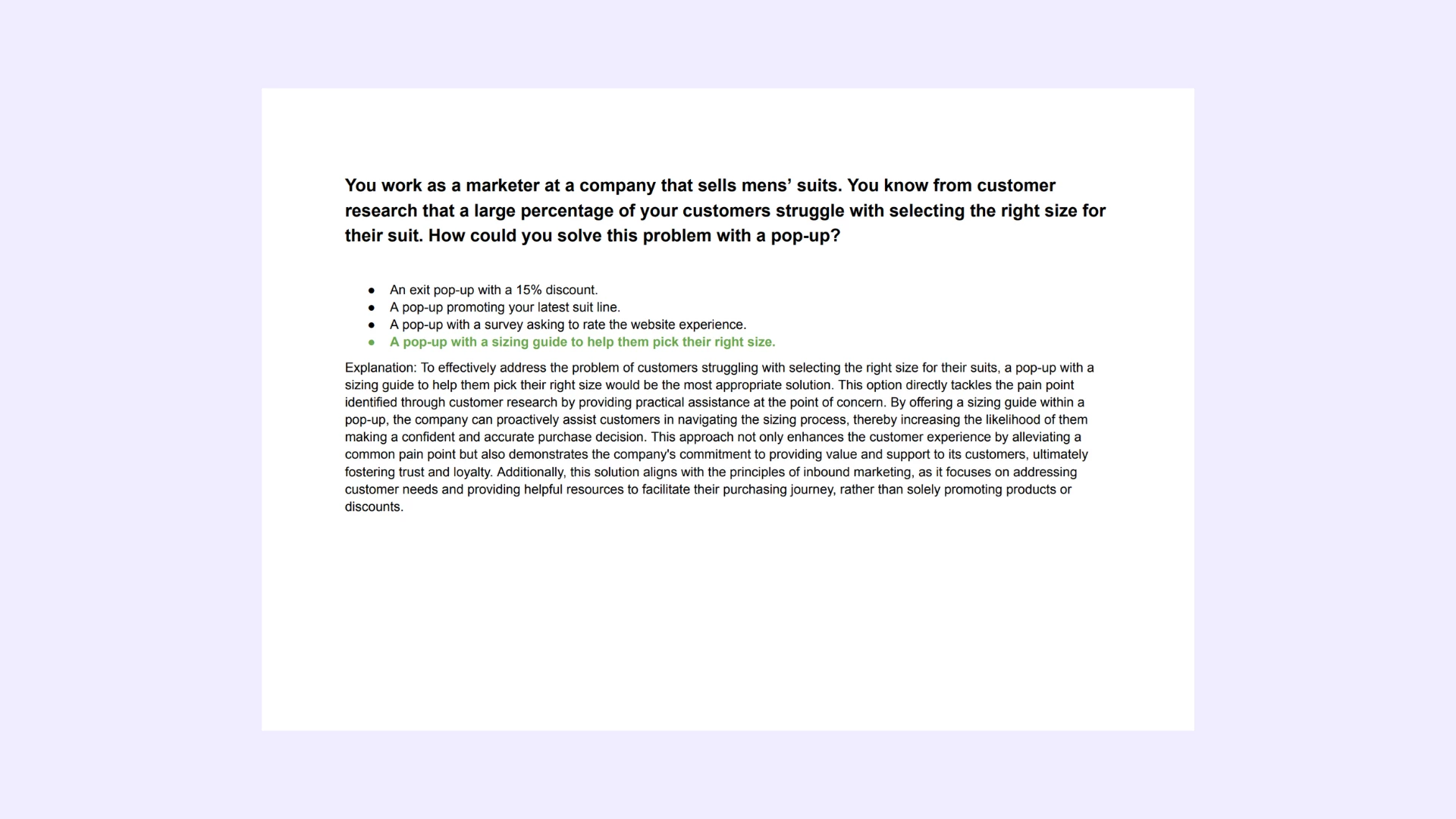True or false? Evaluating the team dynamics and how each member did in the crisis along with analyzing the reactions, KPIs, and overall response to the crisis happens during the response stage.
True
False

HubSpot Roll. Includes Answers for Every Real HubSpot Certification Exam.
All-in-One: Get all HubSpot exams answers with explanations in one bundle. This package includes answers for every current HubSpot certification. Regular updates to reflect the latest exam version. -> See what's included.


Need a single cerification exam answers? Check out our -> list of certification exams answer keys. Learn Smarter. Obtain or Renew your certificates with peace of mind!
Explanation: True or false? Evaluating the team dynamics and how each member did in the crisis along with analyzing the reactions, KPIs, and overall response to the crisis happens during the response stage.
Explanation: The correct answer is **False**. Evaluating the team dynamics and analyzing the reactions, KPIs, and overall response to the crisis typically occurs during the **recovery stage** of crisis management, not the response stage. In the response stage, the primary focus is on implementing the crisis management plan, coordinating communication efforts, and executing strategies to address the crisis promptly and effectively. This involves mobilizing resources, activating response protocols, and managing immediate challenges as they arise. Once the crisis is under control and the initial response efforts are complete, the organization transitions into the recovery stage, where it evaluates the team dynamics and performance during the crisis, conducts post-crisis analysis, and assesses the effectiveness of its response strategies and tactics. By analyzing reactions, key performance indicators (KPIs), and overall response to the crisis, organizations can identify lessons learned, areas for improvement, and opportunities for strengthening crisis preparedness and resilience in the future. Therefore, while evaluating team dynamics and analyzing the crisis response occur as part of the crisis management process, they typically occur during the recovery stage rather than the response stage.

Special Bundle Offer HubSpot Roll. All in One
Note: We conduct daily checks for updates on the exam, ensuring that the file contains the most recent questions from the actual certification program.
Questions | Answers | Explanations. FREE Updates.
You may also be interested:
- Special HubSpot bundle offer - all HubSpot exams in one
- HubSpot CMS for develpers certification exam answers
- HubSpot CMS for develpers II certification exam answers
- HubSpot content hub for marketers certification exam answers
- HubSpot content marketing certification exam answers
- HubSpot contextual marketing certification exam answers
- HubSpot digital advertising certification exam answers
- HubSpot digital marketing certification exam answers
- HubSpot email marketing certification exam answers
- HubSpot frictionless sales certification exam answers
- HubSpot growth driven design certification exam answers
- HubSpot inbound certification exam answers
- HubSpot inbound marketing certification exam answers
- HubSpot inbound marketing optimization certification exam answers
- HubSpot inbound sales certification exam answers
- HubSpot integrating with HubSpot I foundations certification exam answers
- HubSpot marketing hub software certification exam answers
- HubSpot reporting certification exam answers
- HubSpot revenue operations certification exam answers
- HubSpot sales enablement certification exam answers
- HubSpot sales hub software certification exam answers
- HubSpot sales management certification exam answers
- HubSpot sales software certification exam answers
- HubSpot seo certification exam answers
- HubSpot seo II certification exam answers
- HubSpot service hub software certification exam answers
- HubSpot social media marketing certification exam answers
- HubSpot social media marketing II certification exam answers